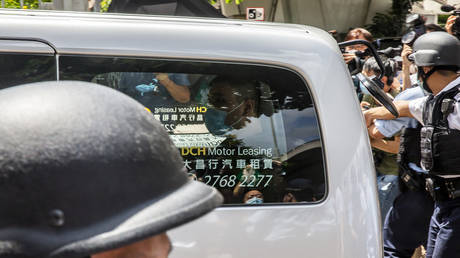
A Hong Kong court convicted Tong Ying-kit on Tuesday after a 15-day trial, marking the first time a person charged under the city’s national security law has been found guilty of inciting secession and terrorism.
The landmark decision means that Tong could face life in prison after being found guilty at a trial that was held without a jury, a departure from Hong Kong’s traditional rule of law.
Tong, who is 24, had been charged with driving a motorbike into three riot police, while carrying a banner that declared “Liberate Hong Kong. Revolution of our times.” The court did not consider an alternative charge of causing grievous bodily harm through dangerous driving.
“The defendant carried out those acts with a view to intimidating the public in order to pursue his political agenda,” Justice Toh, one of the judges presiding over the case, said.
The defendant had pleaded not guilty to all the charges, with his lawyers arguing that it had been an accident and he hadn’t meant to hurt the officers.
The court will reconvene on Thursday to consider his sentence, which will be handed down by three judges who were picked by Hong Kong’s chief executive, Carrie Lam, to handle national security cases.
With more than 100 people having been detained since the national security law came into effect in 2019, Tuesday’s guilty verdict could mark the beginning of a string of convictions of activists who have been accused of violating the legislation since its introduction in 2020.
While there has been international condemnation of the national security law, which human rights groups have claimed silences free speech, China has defended it as necessary to restore stability in a region that was blighted by protests.
The 2019 protests were initially sparked by a planned extradition bill that would allow China to secure the rendition of individuals from Hong Kong who are accused of violating Chinese laws. However, it broke out into a wider movement that demanded democratic reforms and autonomy from China.
In an attempt to prevent future unrest, China implemented a national security law in Hong Kong, which criminalizes secession, subversion, and collusion with foreign forces. While China claims it is simply about ensuring stability and protecting the relationship between China and Hong Kong, opposition figures have accused Beijing of violating the ‘one country, two systems’ principle and seeking to use the legislation to squash dissent in the city state.
Think your friends would be interested? Share this story!




